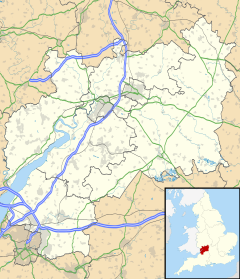Symond's Yat
| Symonds Yat Rock | |
|---|---|
| Symonds Yat Rock shown within Gloucestershire | |
| OS grid reference | SO558168 |
| Civil parish | |
| District | |
| Shire county | |
| Region | |
| Country | England |
| Sovereign state | United Kingdom |
| Post town | COLEFORD |
| Postcode district | GL16 |
| Dialling code | 01594 |
| Police | Gloucestershire |
| Fire | Gloucestershire |
| Ambulance | South Western |
| EU Parliament | South West England |
| UK Parliament | |
Symonds Yat is a village in the Wye Valley and a popular tourist destination, straddling the River Wye and on the borders of the English counties of Herefordshire and Gloucestershire. It is within a few miles of Monmouthshire and the Welsh border. The name is said to come from Robert Symonds, a 17th-century sheriff of Herefordshire, and yat, an old word for a gate or pass.
Archaeologists have uncovered bones from hyenas, sabre-toothed cats and a mammoth in and around the caves of the valley and human habitation can be traced back to 12,000 years ago with findings of their tools and clothes.
In the Iron Age the forts on the Great Doward and Yat Rock provided secure, defensible settlements for the local residents. During Roman times these forts became focal points in the region and the importance of the iron here and in the Forest of Dean made this a valuable prize for the conquerors. Offa's Dyke was built in the 8th century directly above the Yat to separate England and Wales.
The first recorded use of the word Yat in connection with the area was made in 1265. Yat is an old English word for "gate" or "gorge". It is popularly believed that the addition of Symonds was made in the 17th century in reference to Robert Symonds of Sugwas and Evesfield who was indeed a member of the family who owned the lands from Wormelow near Hereford to the border regions in which the Yat stands. He was High Sheriff of Herefordshire in 1685. The area is also shown as Symons Yate on maps in 1665, Symons Yat in 1717 and Symmonds Gate in 1830.
The Old Court Hotel in Symonds Yat (West), which was built in the 16th century, was the ancestral home of the Gwillim family and was home to John Graves Simcoe, who was governor and one of the founding fathers of Upper Canada.
...
Wikipedia



